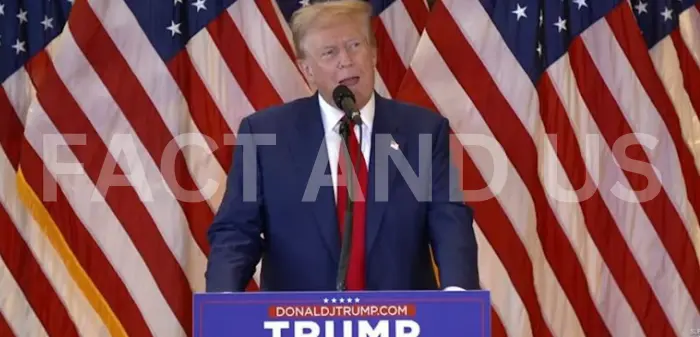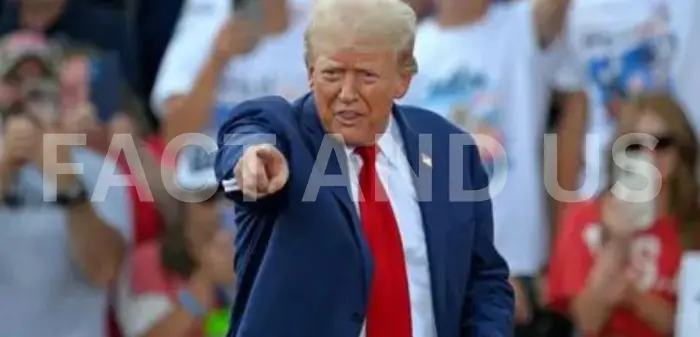In a dramatic turn of events, former President Donald Trump has been caught in a whirlwind of fiery responses and counterattacks following a series of sharp criticisms from the Democratic National Committee (DNC). The escalating feud has not only intensified the political landscape but has also significantly diverted Trump’s messaging, highlighting the ongoing and volatile nature of his public discourse.

The DNC’s recent barrage of critiques has aimed to undermine Trump’s credibility and leadership, focusing on his past controversies and current positions. Their strategy appears to be a concerted effort to capitalize on what they view as his vulnerabilities, particularly in the wake of his repeated claims of a stolen 2020 election and ongoing legal battles.
In response to the DNC’s attacks, Trump has unleashed a series of angry outbursts across his preferred communication platforms. His recent statements have been marked by a combative tone, accusing the DNC of spreading misinformation and attempting to malign his reputation. Trump has characterized the DNC’s attacks as desperate attempts to distract from what he describes as his successful policies and achievements during his presidency.
“Look at what they’re doing,” Trump declared in a recent interview. “The DNC is scared because they know our movement is stronger than ever. They’re throwing everything they’ve got at me, hoping it sticks. But it won’t. We have a record of success that they can’t deny, no matter how hard they try.”
The former president’s reaction underscores his tendency to respond aggressively to perceived slights and challenges. This approach, while energizing his base, risks further alienating moderates and independents who may be turned off by his confrontational style. Critics argue that Trump’s focus on rebutting DNC attacks rather than addressing substantive issues could hinder his broader appeal.

Political analysts have observed that the DNC’s strategy appears to be working to some extent, successfully pulling Trump off his primary messaging of economic revival and conservative policies. By forcing him into a defensive posture, the DNC aims to create a narrative that shifts public perception and undermines his standing with potential voters.
For Trump, who has often relied on rallying his base with assertive and sometimes divisive rhetoric, the current situation represents a high-stakes challenge. The constant stream of attacks and legal issues may complicate his efforts to project a unified and focused message for his 2024 campaign. This has led to a series of erratic responses and policy shifts that could further muddy his campaign’s coherence.
- Kamala Harris pledges ‘new way forward’ in historic convention speech
- America’s future, Gaza and other takeaways from Harris’s address
- Verify fact-checks the speech
- Where does Kamala Harris stand on key issues?
- Influencers swarm convention as Democrats’ secret weapon
The North Carolina event on Wednesday was vintage Trump – and it became a referendum on his own team’s strategy. “They always say, ‘Sir, please stick to policy, don’t get personal’… and yet [the Democrats are] getting personal all night long, these people. Do I still have to stick to policy?” Trump asked. Then he polled the crowd: more policy or go personal? His fans roared, they wanted the Trump show, not a list of boring economic proposals. “My advisers are fired!” he joked. Then he said he’d stick to policy but couldn’t let the attacks go unanswered.
So the campaign strategy now seems to be at the whim of the candidate and the feedback of his crowds. That makes life difficult for his campaign advisers who repeatedly tell me their single biggest concern in this election campaign is whether they can keep Trump focused on issues and off the controversial personal attacks.
- Michelle Obama belittles Trump in starry convention turn
- ‘Coach Walz’ rallies Democrats with personal pitch to middle America
- ‘That’s my dad’: Tim Walz’s son Gus gives tearful reaction to speech There have been a couple of those this week already. Late on Wednesday night, Trump took to social media to criticise the Democratic Pennsylvania Governor Josh Shapiro, who had given a rousing speech earlier in the evening. Trump clearly didn’t like what he heard.
“The highly overrated Jewish Governor of the Great Commonwealth of Pennsylvania, Josh Shapiro, made a really bad and poorly delivered speech,” Trump wrote. “I have done more for Israel than any President…Shapiro has done nothing for Israel, and never will. “The fact that he singled out Mr Shapiro as Jewish has not gone unnoticed. It was picked up on the US morning shows as an example of a racial dog whistle.

After the Obamas criticised Trump at the DNC on Tuesday night, he responded during his rally in North Carolina, and, again, there was a similar racial innuendo. “Did you see Barack Hussein Obama last night,” Trump said. “He was taking shots at your president. And so was Michelle.”
It’s true that they did take pretty personal shots at him, but the use of Mr Obama’s middle name has long been used to stoke racial animosity towards him.
DNC Attacks
The problem for the Trump team is that their candidate thrives on controversy which then dominates headlines, and this distracts from their attempts to point out weaknesses in his opponent’s policy positions.
“It doesn’t matter what he talks about for 45 minutes,” one adviser told me on the condition of anonymity. “One comment or answer to a question gives the left all they need to change the subject.”
Stay connected with Fact and US for more such news.
